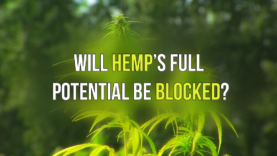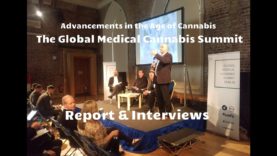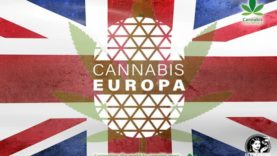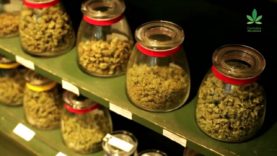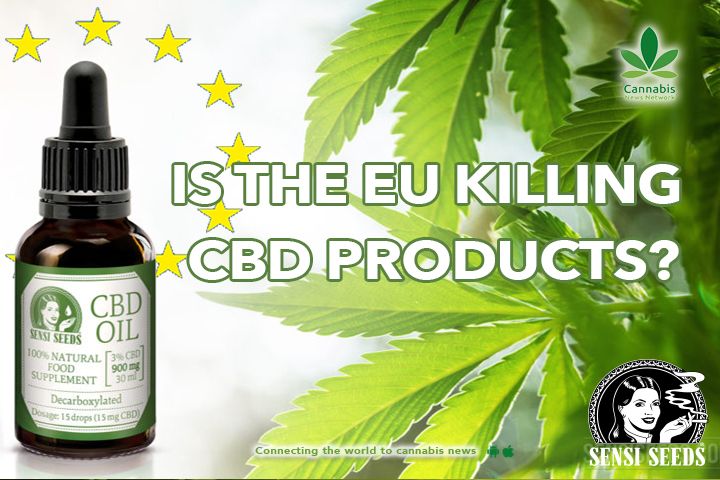
Is the EU killing CBD products?
You might soon find yourself looking for your CBD infused products you were buying at your local drugstore, but they’ve suddenly vanished.
CBD could soon only be available in pharmacies. “Until a further update from the EU, consumers, vendors, and manufacturers may find that the sale of CBD oils, supplements and food is disrupted” warns Hanway Associates, London based Cannabis Consultants.
As we showed earlier in this report. Mark Reinders CEO of Hempflax and president of the European Industrial Hemp Association warned the industry about the pharmaceutical powers/involvement.
And this is causing problems already.
Between 15 and 17 March, over 30.000 visitors are to visit Europe’s biggest cannabis fair Spannabis in Barcelona. Yet the organization has called upon their clients to “act accordingly and not to bring to Spannabis these products, which are not regulated and are being confiscated in different events and companies.” With these products being CBD and CBD infused products.
While the rise of CBD, ‘Cannabis Light’ and other cannabis-infused products has been going on for a while, it took until this year for the European Union to act regulatory. And they’re doing so through the Novel Foods authorization. A term you might not be familiar with and rightfully so. If it weren’t for CBD, you would probably have never heard about it.
Unlike the medicinal cannabis resolution passed by the European Parliament, it didn’t come close to getting the same coverage.
What are Novel Foods?
According to the European Union’s webpage on Novel Foods, it is defined as follows:
Novel Food is defined as food that had not been consumed to a significant degree by humans in the EU before 15 May 1997, when the first Regulation on novel food came into force.
‘Novel Food’ can be newly developed, innovative food, food produced using new technologies and production processes, as well as food which is or has been traditionally eaten outside of the EU.
Examples of Novel Food include new sources of vitamin K (menaquinone) or extracts from existing food (Antarctic Krill oil rich in phospholipids from Euphausia superba), agricultural products from third countries (chia seeds, noni fruit juice), or food derived from new production processes (UV-treated food (milk, bread, mushrooms and yeast).
The underlying principles underpinning Novel Food in the European Union are that Novel Foods must be:
– Safe for consumers
– Properly labeled, so as not to mislead consumers
– If novel food is intended to replace another food, it must not differ in a way that the consumption of the Novel Food would be nutritionally disadvantageous for the consumer.
Pre-market authorization of Novel Foods on the basis of an evaluation in line with the above principles is necessary.
How does this affect current CBD products?
It’s hard to name any other than the examples here and even then, it seems slightly odd to qualify cannabis-derived products as a Novel Food considering it’s long documented use. In fact, there’s a whole searchable Novel Food Catalogue on the European Union’s website. Embedded below a previous item we made interviewing the Stanley Brothers on whether CBD should be classified as medicine or food.
According to Hanway Associates, an application for CBD is underway. The European Food Safety Agency (ESFA) is now to decide whether supplements with a daily intake of 130mg will be authorized. The results are to be published in March 2019.
Before a product can be legally market in the EU, Novel Foods are required to have a pre-market safety assessment and authorization under the Novel Foods Regulation (Regulation (EU) No 2015/2283. Meanwhile, several European countries now allow low THC ‘cannabis light‘ as we’ve reported on below.
We asked August de Loor, drugs expert and chairman of the Cannabinoïden Adviesbureau Nederland (Cannabinoid Advisory Bureau Netherlands) a couple of questions.
CNN: Hi, thanks for doing this. Could you introduce yourself first?
AUGUST: I’m August de Loor, chairman of CAN (Cannabinoïden Adviesbureau Nederland), a platform for the gathering of knowledge and insights about everything related to cannabinoids. This knowledge and insights are available to everybody who is interested. On top of that, CAN has been an interlocutor with multiple authorities and governments to realize effective policy considering the many positive applications of cannabinoids. The board and members consist of people varying from all parts of the cannabis industry chain, in addition to lawyers, pharmacologists, pioneers from the very beginning, to mainstream companies such as drugstore chains.
CNN: These new regulations seem to have come out of nowhere, how come? Or why not?
AUGUST: The novel food regulation certainly does not come out of the blue. In recent years much has been done to downplay the (so-called wonder) effects of cannabinoids, of contaminated oils, lack of clarity about the composition of the oils (including many overlaps of THC containing oils and pure CBD), of negative perception, politics, media, authorities and authorities about cannabinoids because it is associated with the world of drugs, the cannabis trade, cold water fears in primary health care and mental health care to get started with cannabis products. And all of that within the many European countries.
CNN: What does this mean for the current European CBD market?
AUGUST: The Novel Food Catalogue process can be positively inserted as an instrument of the cannabinoids. So they’re not to be classified under either strict drug laws or pharma regulations but remain as a commodity. The consequence of the Novel Food trajectory is that research is necessary to find out cannabinoids like CBD are (or are not) harmful to health. During this investigation, CBD should be withdrawn (read: should not be sold). And the latter is in many ways an extremely undesirable situation that CAN wants to avoid in all possible ways through consultation with governments, politicians, publicity, cooperation with sister organizations etc.
CNN: Is there anything you would like to add?
AUGUST: There’s every reason to work together to ensure that all parties involved work towards a quality mark for CBD oils, which could also be applied to oils with THC. And working towards the legalization of cannabis for recreational use including allowing home-grown cannabis and stopping the witch hunt of house evictions etc.
It’s time to start with this three-step strategy of recognizing the diverse uses of cannabis, not forgetting the fourth aspect of the many beautiful products you can make with this plant!
August also has his own website, augustdeloor.nl and can be found on Twitter: @augustdeloor.
And in the US?
After the recent passage of the 2018 Farm Bill and the federal legalization of industrial hemp, this week the U.S. Department of Agriculture (USDA) responded to prospective hemp farmers. Furthermore, in the same week, the Federal Drug Agency (FDA) head revealed new details about plans to “pursue alternative pathways for CBD regulation”. Embedded below Doug Fine reporting recently from Hawaii.
“It’s going to be a challenge,” said Bob Hoban when asked about this shift of the Departments shift. Robert (Bob) Hoban is one of the leading lawyers in the cannabis and hemp industry. He has worked as a cannabis policy professor at the University of Denver, where he taught cannabis policy courses in Colorado and across the globe. We got to interview Bob at the FAAAT conference in December last year.
“Will it be food? A supplement? A functional food? Medicinal food? That’s the different patterns we’re looking at” Bob Hoban said to us in a later interview.
GW Pharmaceuticals recently managed to get the FDA to approve its cannabis-derived product, now the first federally legal prescription drug.
“Presume I found a berry in a far away rain forest. Nobody used that berry before and I brought it back with me to the United States. And I wanted to make that berry in a drug to treat your specific condition… If I inked that application with that berry with the FDA before that berry was sold over the country as a naturally occurring product, then the drug gets to use that product, not the retailers. So if CBD had to be sold as a supplement or as a food product before GW put in their application in for Epidolex (GW’s approved drug), that is the technical reading of the Food, Drug, and Cosmetic Act.” Bob furthermore states.
On a positive note, Bob concludes: “Considering there are hundreds of billions of dollars already in a US based economy, infrastructure including warehouses and production facilities and consumer demand, I just think it’s too big to fail right now”







